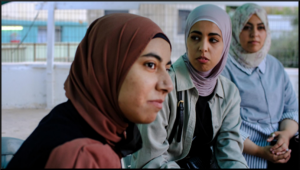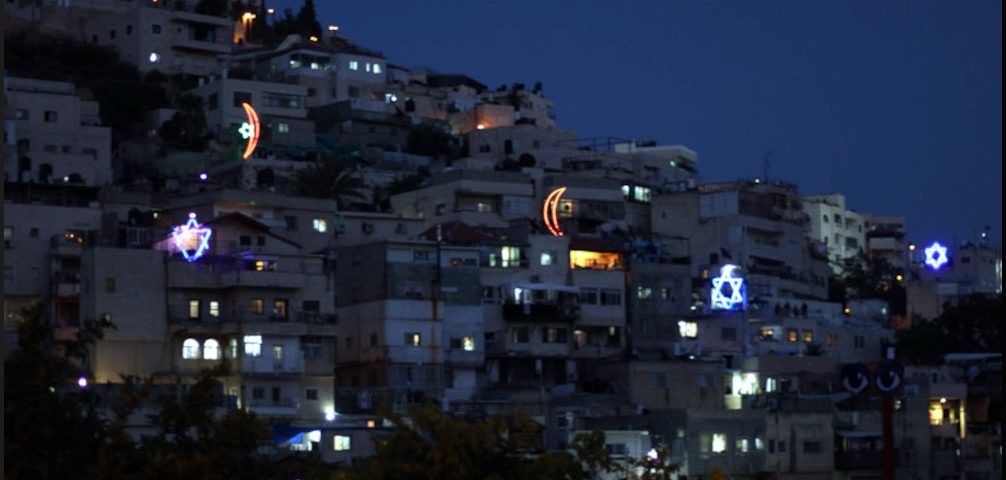by Kelly Kunzel, published on Electronic Intifada, September 14, 2021
Caution tape still adorns the ruins of what was once a butcher shop owned by Nidal al-Rajabi in the occupied East Jerusalem neighborhood of Silwan. On 29 June, with one pass or sweep of a bulldozer, Israeli forces razed al-Rajabi’s shop, which provided the sole income to support 14 people.
For 1,500 people in the al-Bustan quarter of Silwan threatened with displacement and demolition, the pile of rubble represents the remnants of a much larger fight against Israel’s efforts to expel Palestinians from the area.
Amani Odeh, a 34-year-old dentist, has been waging this battle since Israeli authorities delivered demolition orders at her parents’ door in 2005. Demolitions in the neighborhood threaten to displace all 170 of her relatives spread across 39 houses.
“I have been in Silwan my whole life, it is all I have known,”
Odeh told The Electronic Intifada.
The house has belonged to her family for decades. It is where Amani Odeh grew up, got married and is now raising her family next door, including an 11-year-old son and 7-year-old daughter, named Silwan.
Odeh lives in an extension to her family home that she and her husband built in 2017 to accommodate their growing family.
Israeli authorities refused to grant Odeh the permits to construct the additional unit. And within a few weeks of building the extension, the authorities issued an order to destroy it or face a hefty fine.
Israeli authorities “don’t give Palestinians permits to build big houses but we are increasing in numbers, so we have to add rooms to the original buildings but they won’t even let us do that,” Odeh said.
“Where else will we go? It’s not humane.”
Around 1,500 residents spanning close to 100 buildings in al-Bustan are facing displacement from demolition orders, according to Amy Cohen of Ir Amim, an Israeli group that monitors settlement activity in Jerusalem.
According to Cohen, 48 families submitted a request to extend a temporary demolition freeze, which has been extended until February 2022.
Yet the freeze does not cover another 16 buildings in al-Bustan facing imminent demolition.
Following changes to planning laws introduced in 2017, the Israeli authorities can fast-track the demolition of Palestinian buildings in many cases. The authorities no longer require court orders for demolitions since those changes came into effect.
Amani Odeh’s home is one of the 16 buildings in al-Bustan facing imminent demolition by Israeli authorities. Odeh is blocked from having the case reviewed in court because of the 2017 amendment to Israel’s planning laws.
The Rajabi family – owners of the butcher shop destroyed in June – are in the same situation. Their home could be destroyed at any moment.
Theme park
Demolitions in the neighborhood are part of a plan being advanced by the Israeli-controlled Jerusalem municipality and the settler group Elad.
Elad’s declared objective is to “Judaize” East Jerusalem so that a theme park named after the biblical character King David can be established.
“The City of David park would serve to create this territorial contiguity with the area between the settlements and touristic enterprises while at the same time eroding the fabric of life in the community, the character of Silwan as a Palestinian neighborhood, and the Palestinian presence in the area altogether,”
said Amy Cohen from the settlement monitoring group Ir Amin.

Residents in al-Bustan received demolition orders in 2005 when the municipality first pushed for an evacuation of the area to make way for a tourist park called King David’s Valley.
The project was slightly repackaged in 2010 by a municipality plan known as the King’s Garden Plan, which designated Silwan as “a mixed tourism-housing area.” Local and international pressure may have slowed the implementation of the project since 2010, Cohen said.
But this year’s acceleration of demolitions might signal a revitalization of the project.
“Palestinian communities are becoming more fragmented and pushed into smaller enclaves,”
Cohen told The Electronic Intifada.
Israel’s demolition of Palestinian property is illegal under international law.
Erasing Palestinian history
Situated on a slope just below the Old City of Jerusalem, Silwan is the nucleus of Palestinian life in the occupied eastern part of the city.
The neighborhood makes up a large portion of the so-called Holy Basin, which stretches from the Muslim and Christian quarters of the Old City to the Mount of Olives. Israeli settlers use the term as a claim of religious significance for the area, a pretext to justify the theft of Palestinian land.
Elad has long targeted Silwan as a part of its mission to expand Jewish presence across the city and to uproot the indigenous Palestinian population under the guise of archeological and touristic endeavors.
Demolitions in Silwan accelerated after the enactment of the 2017 Kaminitz Law, an amendment to the 1965 Planning and Building Law. The amendment was established for “enforcement and penalization of planning and building offenses,” according to Adalah, an advocacy group for Palestinian citizens of Israel, but has denied a judicial process to Palestinians in al-Bustan whose buildings are slated for demolition.
The amendment is in keeping with a history of discriminatory housing policies, under which Palestinians have been expelled from Jerusalem for decades.
In 1973, the Israeli government endorsed recommendations from the Interministerial Committee to Examine the Rate of Development for Jerusalem – also known as the Gafni Committee – to maintain a demographic imbalance in the city of a majority of 74 percent Jewish Israelis and 26 percent Palestinians.
Israel’s efforts to maintain this demographic imbalance and Judaize Jerusalem are implemented through a severely restrictive network of discriminatory zoning and planning policies, said Jeff Halper, director of the Israeli Committee Against House Demolitions.
In 1976, Israel declared an area surrounding the Old City and its environs a national park, classifying residential areas of Silwan as “green” zones open for public planning and zoning.
Apart from two projects, no other public planning outlines have been put forward for Palestinian neighborhoods in East Jerusalem. Only 13 percent of the land has been allocated for future construction of Palestinian neighborhoods, while 35 percent has been zoned for the expansion of Israeli settlements in East Jerusalem.
“Housing, zoning, planning are all very dry, complex bureaucratic language, but this is much more effective than the military means in terms of Judaizing the city,”
Halper told The Electronic Intifada.
“Israel can take over Silwan without raising too much international outcry because it is all done slowly, under the radar.”
Such policies make it nearly impossible for Palestinians to obtain a building permit from the Jerusalem municipality, forcing residents to build “illegally” and risk home demolition.
From 1991 to 2019, the Israeli-controlled Jerusalem municipality issued more than 21,000 permits for the construction of Jewish settlement units in East Jerusalem, while less than 10,000 were allotted for Palestinians.
The number of structures demolished in East Jerusalem rose by 44 percent in June this year, compared with the previous five months.
A 2019 report by UN monitoring group OCHA detailed that one-third of Palestinian homes in East Jerusalem were built without permits, putting 100,000 residents at risk of forcible displacement by Israeli authorities.
Simultaneously, Palestinians in the Batan al-Hawa area of Silwan are facing expulsion in Israeli courts. The far-right settlement organization Ateret Cohanim has dragged residents into decades-long battles for land ownership rights of the homes in order to replace them with Jewish settlers.
Illegal touristic endeavors in Silwan pioneered by Elad also include excavations for the “City of David” park project. The underground tunnels have left Palestinian homes in the area crumbling since they were first dug in 2000.
“Archeology is part of the Judaization process also,”
Halper added.
“You can dig and destroy all the layers until you get down to the ancient Israelite layer to show the tourists. In this way, they can erase all the Palestinian history down to the history Israel wants to highlight.”
“A political situation”

The most recent demolitions in Silwan came after the municipality rejected new zoning plans put forth for the third time by residents, Fakhri Abu Diab, a prominent community activist in Silwan, told The Electronic Intifada.
Residents worked with Yosef Jabareen, an urban planning professor at the Technion in Haifa, to develop a new outline for the neighborhood. Its purpose was to allow optimal space for development in order to accommodate a growing population as per a spoken agreement with the municipality to extend the demolition freeze.
The neighborhood collectively spent $500,000 on plans, Abu Diab said, putting forward a different design each time. When residents pressed the municipality on why the outlines continued to be rejected, they were only told that the ruling came from Israel’s interior ministry.
“This proves that the permits are just excuses, it is clearly a political situation.”
Abu Diab said.
Israeli authorities are also threatening to demolish Abu Diab’s home in al-Bustan where his wife, five children and 12 grandchildren live.
Israeli authorities denied Abu Diab building permits seven times, forcing him to build a two-room extension to his own home without Israeli permits. Despite the addition, living conditions are still cramped.
“If you will go inside and look at it, it will look like a refugee camp with so many people. It’s not enough room at all but we have no other option,”
Abu Diab said.
“Am I going to sleep in the streets just so they can build a garden over my house?”
Abu Diab said.
“Every day here we say this may be the last night sleeping in our homes, [Israeli forces] may come tomorrow and destroy it,”
Abu Diab said.
“If we don’t do it ourselves, the municipality will charge us 1,000 shekels per meter of what they demolish.”
Since 29 June, Israeli forces have attacked Palestinians protesting the demolition with rubber-coated steel bullets and tear gas, injuring at least 19.
In scenes reminiscent of the ongoing situation in the adjacent neighborhood of Sheikh Jarrah – where Israeli forces have continued to brutally police Palestinian residents protesting a complete take over of their homes by settlers – Silwan was also declared a closed military zone on 20 July.
Israeli forces installed checkpoints on roads entering and exiting the neighborhood, further restricting freedom of movement for Palestinians in the city.
“The situation is very awful. Every day someone is arrested. Every day there are clashes, the police are giving fines. And every other day there is the sound of rubber bullets,”
Abu Diab told The Electronic Intifada.
“I wouldn’t let my kids go out after 7 pm because they may be arrested or shot.”
So desperate is the situation that Palestinians are demolishing their own homes to avoid being landed with a bill if Israel carried out the demolition.
So far this year, 45 percent of demolitions have been carried out by their owners, a 27 percent increase from the previous five years.
The increase has been attributed to new legislation that gives the Israeli-controlled Jerusalem municipality the power to exert pressure on families to demolish their own structures, according to the UN monitoring group OCHA.
Israel has demolished and confiscated more than 670 Palestinian structures in the occupied West Bank since the beginning of the year, displacing nearly 1,000 people. Almost half of those displaced were children.
This includes 116 structures in occupied East Jerusalem, where more than 200 people have been displaced.
Residents have engaged in public art projects in the neighborhood and communal dinners as another form of protest. Amani Odeh also organizes weekly gatherings for youth activists.
Odeh held back tears as she told the teens at one such recent meeting:
“There is an old folk tale that says Silwan is a well that you drink from and forget your heartbreak.”
*Featured Image: Homes taken over by Israeli settlers decorated with Stars of David are seen among Palestinian homes in the Silwan neighborhood of Jerusalem on 12 June. ~ ActiveStills
Kelly Kunzl is an American freelance journalist, reporting on Palestine.
